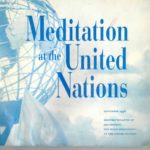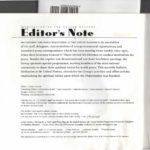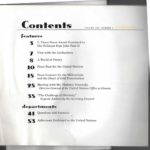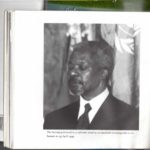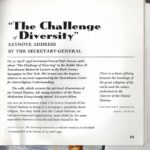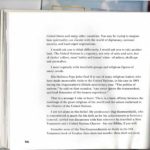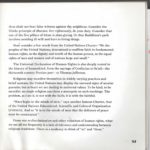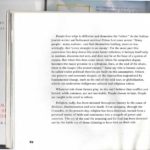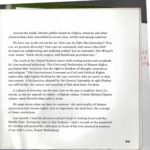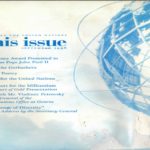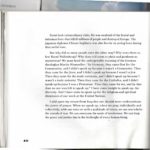The Challenge of Diversity” Address by UN SG, Kofi Annan 27 April 1998.
Filed under interfaith excerpt or quote | MG Members in other events | Thoughts from the UN community.Talk at on Diversity published in 1998 Sep issue of “Meditation at the UN.” Published by Sri Chinmoy:the Peace Meditation at the UN.
SECRETARY-GENERAL STRESSES RELIGIOUS, SPIRITUAL DIMENSIONS OF UN WORK, IN KEYNOTE ADDRESS
27 April 1998 Press Release SG/SM/6541/Rev.1*
| “The Challenge of Diversity” Keynote Address by the Secretary-General, Kofi Annan. (correction to 27 April 1998 – date as per UN press release UN-SG-SM-6541-Rev01 with final text as delivered) Secretary-General Kofi Annan spoke about “The Challenge of Diversity” in the Rabbi Marc H. Tanenbaum Memorial Lecture at the Park Avenue Synagogue in New York. His lecture was the keynote address in an event organised by the Tanenbaum Center for Interreligious Understanding.
https://www.un.org/press/en/1998/19980427.SGM6541R.html see revised text adjusted after delivery
“There is a basic affinity between the teachings of the great religions of the world and the values enshrined in the Charter of the United Nations,” -Secretary-General Kofi Annan
So we have our work cut out for us. How can we fight discrimination? How can we promote diversity? How can we transcend, and ensure that faith becomes an enlightening and unifying reality? Let us remember what Elie Wiesel once told me: “Faith elicits respect, and fanaticism provokes hate”. I have come tonight to speak up: for diversity. And I have come to speak up for the religious and spiritual dimension of our work at the United Nations. I said upon my return from Iraq that we should never underestimate the power of prayer. When we speak up, when we pray, individually and collectively, with one voice or with a multitude of voices, we can overwhelm the sounds of war. If we can overcome the seeds of intolerance, we can forge the peace and justice that is the birthright of every human being.” |
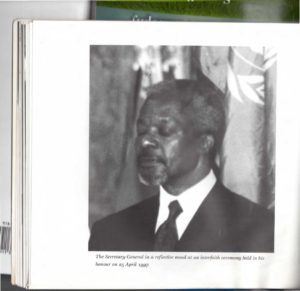 |
full text in rev 1 press release
SG/SM/6541/REV.1* 27 APRIL 1998 PRESS RELEASE SECRETARY-GENERAL STATEMENTS AND
MESSAGES
SECRETARY-GENERAL STRESSES RELIGIOUS, SPIRITUAL DIMENSIONS OF
UNITED NATIONS WORK, IN KEYNOTE ADDRESS 27 April 1998 Press Release SG/SM/6541/Rev.1*
SECRETARY-GENERAL STRESSES RELIGIOUS, SPIRITUAL DIMENSIONS OF UNITED NATIONS
WORK, IN KEYNOTE ADDRESS
1998-04-27 Speaks on “Challenge of Diversity” at Event By Tanenbaum Center for Interreligious Understanding
Following is the text of the keynote address by Secretary-General Kofi Annan on “The
Challenge of Diversity” for the Rabbi Marc H. Tanenbaum Memorial Lecture, delivered this evening
at the Park Avenue Synagogue, New York:
Excerpts …” TheTanenbaum Center for Interreligious Understanding has earned a global reputation for promoting tolerance and harmony among people of different faiths. The Center’s namesake, Rabbi Marc
Tanenbaum, was a remarkable individual: a leading Jewish ecumenical leader with a special concern
for social justice and for refugees. Like Elie Wiesel today, Rabbi Tanenbaum fought for the rights and
well-being of us all. This Center continues that proud tradition of activism. I am grateful to Dr. Georgette Bennett,
the Center’s President, for continuing her late husband’s life-work; to Richard A. Smith, who
underwrites this Memorial Lecture on an annual basis; and to all others who have had a hand in
granting me this opportunity to be part of your unique community this evening.
You may be wondering what a Secretary-General of the United Nations is doing in a
synagogue, speaking about religion. You may think that the United Nations, an intergovernmental
organization, must abide by the same separation between Church and State found in the United States
and in many other countries. You may be trying to imagine how spirituality can coexist with the
world of diplomacy, national security and hard-edged negotiations.
I would ask you to think differently; I would ask you to take another look. The United Nations
is a tapestry, not only of suits and saris but of clerics’ collars, nuns’ habits and lamas’ robes; of mitres,
SECRETARY-GENERAL STRESSES RELIGIOUS, SPIRITUAL DI… https://www.un.org/press/en/1998/19980427.SGM6541R.html
2 of 7 12/28/2020, 5:19 PM
skullcaps and yarmulkes.
I meet regularly with inter-faith groups and religious figures of many creeds.
His Holiness Pope John Paul II is one of the many religious leaders who have made
memorable visits to the United Nations, in his case in 1995 during the fiftieth anniversary year of the
United Nations. “The politics of nations”, he said on that occasion, “can never ignore the
transcendent, spiritual dimension of the human experience”.
– 3 – SG/SM/6541/Rev.1 27 April 1998
That is a message I take to heart. There is a basic affinity between the teachings of the great
religions of the world and the values enshrined in the Charter of the United Nations.
I am not alone in this belief. My predecessor Dag Hammarskjöld, who is remembered as
much for his faith as for his achievements as Secretary-General, carried two documents with him
wherever he travelled: a New Testament and a United Nations Charter: his two Bibles, if you will.
Consider some of the Ten Commandments set forth in the Old Testament book of Exodus:
thou shalt not murder; thou shalt not steal; thou shalt not bear false witness against thy neighbour.
Consider the Hindu principle of dharma: live righteously, do your duty. Consider that one of the five
pillars of Islam is alms-giving. Or that Buddhism’s path involves avoiding ill will and hurt to living
things.
Now consider a few words from the United Nations Charter: “We the peoples of the United
Nations, determined … to reaffirm faith in fundamental human rights, in the dignity and worth of the
human person, in the equal rights of men and women and of nations large and small”.
The Universal Declaration of Human Rights is also deeply rooted in the history of
humankind: from the sayings of Confucius to Sa’adi, the thirteenth century Persian poet, to Thomas
Jefferson.
Religions may manifest themselves in widely different practices and belief systems; the
United Nations may display the outward signs of secular pursuits; but at heart we are dealing in
universal values. That is what the United Nations is good at. To be kind, to be merciful: no single
religion can claim a monopoly on such teachings. The problem, as I see it, is not with the faith; it is
with the faithful.
“Wars begin in the minds of men”, says another famous Charter, that of the United Nations
Educational, Scientific and Cultural Organization (UNESCO); and so “it is in the minds of men that
SECRETARY-GENERAL STRESSES RELIGIOUS, SPIRITUAL DI… https://www.un.org/press/en/1998/19980427.SGM6541R.html
3 of 7 12/28/2020, 5:19 PM
the defences of peace must be constructed”.
From war to discrimination and other violations of human rights, what we see all too
frequently is a lack of tolerance and understanding between religious traditions. There is a tendency
to think of “us” and “them”. People fear what is different, and demonize the “other”. As the Italian-
Jewish writer and Holocaust survivor Primo Levi once wrote:
“Many people — many nations — can find themselves holding, more or less wittingly, that
`every stranger is an enemy’. For the most part this conviction lies deep down like some latent
infection; it betrays itself only in random, disconnected acts, and does not lie at the base
– 4 – SG/SM/6541/Rev.1 27 April 1998
of a system of reason. But when this does come about, when the unspoken dogma becomes
the major premise in a syllogism, then, at the end of the chain, there is the Laager [the armed
camps].”
Some say this is human nature. So-called realist political theories are built on this assumption.
Others cite poverty and economic despair; or the insecurities engendered by fundamental change,
such as the end of the cold war; or globalization, which can undermine indigenous cultural and
religious values.
Whatever role these factors play, in the end I believe that conflict and hatred, while common,
are not inevitable. People choose to hate. People are taught to be cruel to others.
Religion, sadly, has been misused throughout history in the cause of division, discrimination
and even death. From antiquity through the Crusades to the present day, religion has been distorted,
turned from a personal matter of faith and sustenance into a weapon of power and coercion. The cry
of the soul for meaning, and for God, has been drowned out by the battle cry of those claiming to
have God on their side.
Around the world, identity politics based on religion, ethnicity and other characteristics have
intensified in recent years within and among countries.
…
SECRETARY-GENERAL STRESSES RELIGIOUS, SPIRITUAL DI… https://www.un.org/press/en/1998/19980427.SGM6541R.html
4 of 7 12/28/2020, 5:19 PM
…Intolerance need not lead to overt violence or outright conflict to leave scars. Insidious
discrimination inflicts its own brand of harm. Religious minorities, for example, are often denied
citizenship or banned from practicing their religion. Textbooks fail to reflect the diversity of a given
society, or worse, preach a message of intolerance towards some religions.
– 5 – SG/SM/6541/Rev.1 27 April 1998
It is important to remember that intolerance and extremism can occur not only between
religions but within a religion. …I think you will agree that family quarrels can
sometimes be among the most painful and divisive.
So we have our work cut out for us. How can we fight discrimination? How can we promote
diversity? How can we transcend, and ensure that faith becomes an enlightening and unifying reality?
Let us remember what Elie Wiesel once told me: “Faith elicits respect, and fanaticism provokes hate”.
The work of the United Nations starts with setting norms and standards for international
behaviour. The Universal Declaration of Human Rights proclaims that “everyone has the right to
freedom of thought, conscience and religion”. The International Covenant on Civil and Political
Rights makes this right legally binding for the 140 countries who are party to that instrument. A
Declaration adopted by the General Assembly in 1981 fleshes out still further the nature and meaning
of this most basic freedom.
As valuable as these instruments are, they are but laws on the books. The situation on the
ground is such that the Commission on Human Rights, with the encouragement and support of the
United States Government, decided in 1986 to appoint an independent special rapporteur to examine
incidents and governmental action in all parts of the world inconsistent with the provisions of the
1981 Declaration.
Through visits to countries and other information-gathering, the rapporteur documents
violations and trends. He stresses the need not simply to control discrimination but to prevent it
through interfaith dialogue and, in particular, education.
In a related realm, the International Criminal Tribunal for the Former Yugoslavia in The
Hague is doing its part to prosecute allegations of genocide and crimes against humanity — crimes
SECRETARY-GENERAL STRESSES RELIGIOUS, SPIRITUAL DI… https://www.un.org/press/en/1998/19980427.SGM6541R.html
5 of 7 12/28/2020, 5:19 PM
sometimes committed in the name of religion. … The international
community needs new and innovative tools. There is ample room for religious figures and
organizations such as the Tanenbaum Center to be an even bigger part of this work than they already
are.
– 6 – SG/SM/6541/Rev.1 27 April 1998
You can, for example, participate in world conferences and other United Nations forums. …
Surely religious groups and congregations have a special bond with — and responsibility to — the
youth of the world….
…Religious groups can also form interfaith groups for dialogue, and carry out advocacy and
public education campaigns. You might also offer your good offices. ..
A culture of diversity can be ours. Just as the pen is mightier than the sword, so too are
appeals to values — religious values, United Nations Charter values — more forceful than any call to
arms.
We must stress what we have in common: the universality of human aspirations and human
SECRETARY-GENERAL STRESSES RELIGIOUS, SPIRITUAL DI… https://www.un.org/press/en/1998/19980427.SGM6541R.html
6 of 7 12/28/2020, 5:19 PM
rights. Just as important, we must have the courage of these convictions.
…
– 7 – SG/SM/6541/Rev.1 27 April 1998
…I have come tonight to speak up: for diversity. And I have come to speak up for the religious
and spiritual dimension of our work at the United Nations.
… we should never underestimate the power of prayer.
When we speak up, when we pray, individually and collectively, with one voice or with a multitude
of voices, we can overwhelm the sounds of war. If we can overcome the seeds of intolerance, we can
forge the peace and justice that is the birthright of every human being.
For your enlightened leadership in this vital endeavour, I say thank you.
* *** *
For information media. Not an official record.
